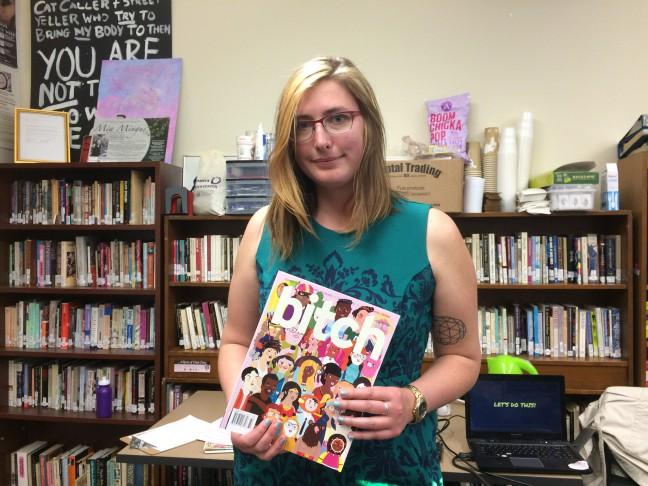Sarah Mirk, Bitch Media online editor, outlined three main areas activists must consider: goals, community and tools.
It’s important to establish specific expectations and goals before springing into action, Mirk said.
“When I was in school, I was too big-picture,” Mirk said. “I was like ‘we need to end all wars, we need to end sexism and racism,’ but how do you focus on specific things within that? What is the bill you want to pass, or the protest you want to focus on?”
A group of students from different academic backgrounds gathered in the Campus Women’s Center to hear Mirk share the story of how she used media to become an effective activist. Bitch Media is a nonprofit, independent, feminist media organization.
Mirk began her career as a reporter, later created a series of comics of Oregon history and wrote a book on dating called “Sex from Scratch.”
She used the example of “Drop the I-Word Campaign,” an initiative to stop using the word “illegal” to describe undocumented immigrants. Race Forward, the group that put together the campaign, had thousands of people sign a petition and established a journalism style guide with words to substitute “illegal.”
Many major media outlets, including The Associated Press, dropped the word due to their effort, Mirk said. She said this was a success because the group had concrete goals.
It’s also important to focus on the community and audience to figure out who will be interested in the causes, Mirk said. She used her personal anecdote in college to demonstrate that action campaigns are ineffective if facing the wrong audience.
To protest against raising tuition, she and her friends wore t-shirts with “solidarity” written on them and paraded around campus. But Mirk’s problem was her audience, or lack of one. The only people who saw her protest were students who were equally offended by the issue, but didn’t know what to do.
“Who didn’t see that protest? People who are in the decision-making process of raising our tuition,” Mirk said. “We didn’t connect with other groups that may be interested in that issue, we didn’t figure out who was actually responsible for that and talk to them, and we didn’t capitalize on any resources available, or do much research to find better options.”
The third thing activists should know is how to effectively use tools, Mirk said. One of the biggest tools is to approach people in position of power who can actually affect change. She encouraged attendees to discover the existing mechanism of power and try to infiltrate them.
Mirk said media is another effective tool due to its diversity and versatility.
Mirk said the workshop was relevant to University of Wisconsin’s campus because there are many people who care about social issues and politics. She said she hoped the event empowers people to use effective tools, especially media, to work on issues they care about.
“You don’t need anyone’s permission to make media that you care about or write about things that you care about,” Mirk said. “Right now, we have the technology to publish your own work, so if there’s something you really care about to write about, rather than feeling like you need someone else’s permission to do it, you can do it yourself and you’re probably more capable like anybody else is.”


